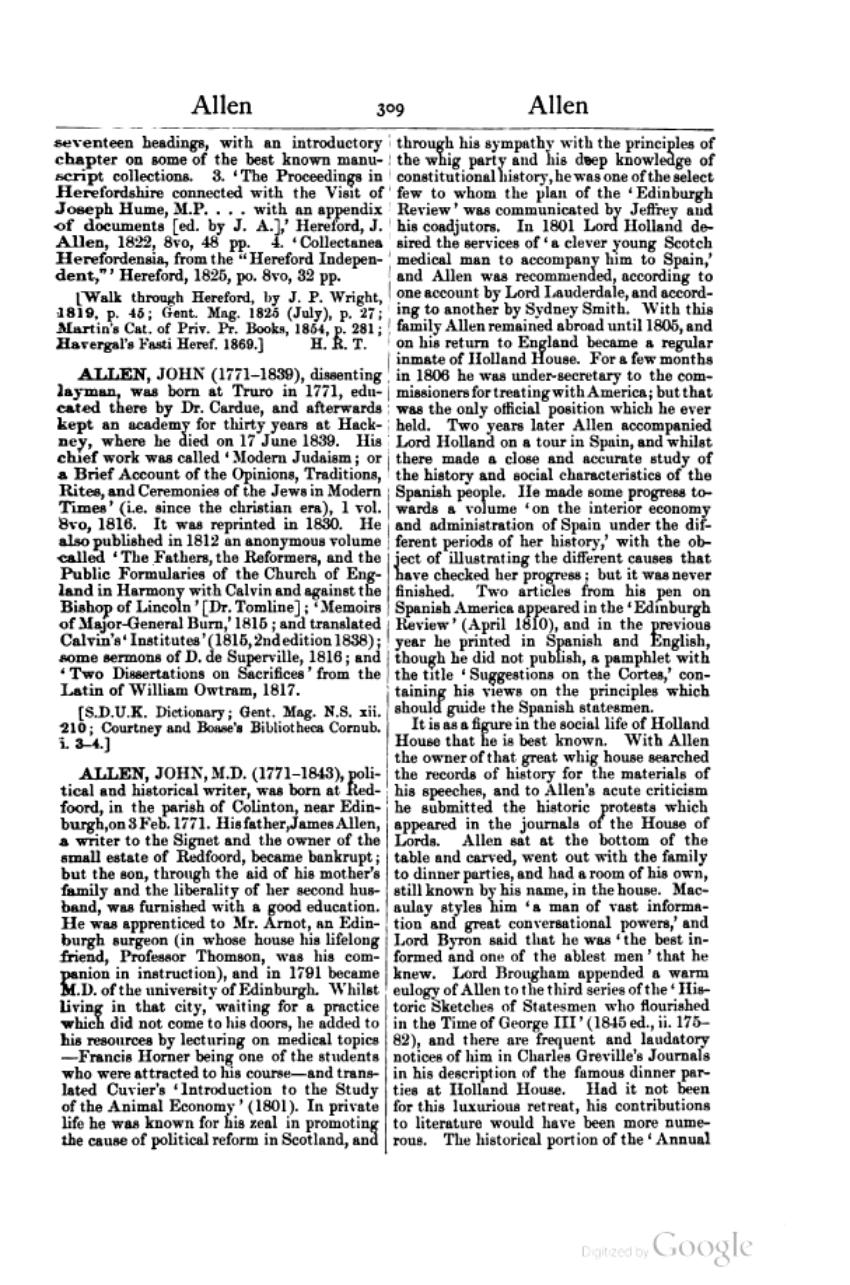- seventeen headings, with an introductory chapter on some of the best known manuscript collections.
- ‘The Proceedings in Herefordshire connected with the Visit of Joseph Hume, M.P. … with an appendix of documents [ed. by J. A.],’ Hereford, J. Allen, 1822, 8vo, 48 pp.
- ‘Collectanea Herefordensia, from the “Hereford Independent,”’ Hereford, 1825, po. 8vo, 32 pp.
[Walk through Hereford, by J.P. Wright, 1819, p. 45; Gent. Mag. 1825 (July), p. 27; Martin's Cat. of Priv. Pr. Books, 1854, p. 281; Havergal's Fasti Heref. 1869.]
ALLEN, JOHN (1771–1839), dissenting layman, was born at Truro in 1771, educated there by Dr. Cardue, and afterwards kept an academy for thirty years at Hackney, where he died on 17 June 1839. His chief work was called ‘Modern Judaism; or a Brief Account of the Opinions, Traditions, Rites, and Ceremonies of the Jews in Modern Times’ (i.e. since the christian era), 1 vol. 8vo, 1816. It was reprinted in 1830. He also published in 1812 an anonymous volume called ‘The Fathers, the Reformers, and the Public Formularies of the Church of England in Harmony with Calvin and against the Bishop of Lincoln’ [Dr. Tomline]; ‘Memoirs of Major-General Burn,’ 1815; and translated Calvin's ‘Institutes’ (1815, 2nd edition 1838); some sermons of D. de Superville, 1816; and ‘Two Dissertations on Sacrifices’ from the Latin of William Owtram, 1817.
[S.D.U.K. Dictionary; Gent. Mag. N.S. xii. 210; Courtney and Boase's Bibliotheca Cornub. i. 3–4.]
ALLEN, JOHN, M.D. (1771–1843), political and historical writer, was born at Redfoord, in the parish of Colinton, near Edinburgh, on 3 Feb. 1771. His father, James Allen, a writer to the Signet and the owner of the small estate of Redfoord, became bankrupt; but the son, through the aid of his mother's family and the liberality of her second husband, was furnished with a good education. He was apprenticed to Mr. Arnot, an Edinburgh surgeon (in whose house his lifelong friend, Professor Thomson, was his companion in instruction), and in 1791 became M.D. of the university of Edinburgh. Whilst living in that city, waiting for a practice which did not come to his doors, he added to his resources by lecturing on medical topics—Francis Horner being one of the students who were attracted to his course—and translated Cuvier's ‘Introduction to the Study of the Animal Economy’ (1801). In private life he was known for his zeal in promoting the cause of political reform in Scotland, and through his sympathy with the principles of the whig party and his deep knowledge of constitutional history, he was one of the select few to whom the plan of the ‘Edinburgh Review’ was communicated by Jeffrey and his coadjutors. In 1801 Lord Holland desired the services of ‘a clever young Scotch medical man to accompany him to Spain,’ and Allen was recommended, according to one account by Lord Lauderdale, and according to another by Sydney Smith. With this family Allen remained abroad until 1805, and on his return to England became a regular inmate of Holland House. For a few months in 1806 he was under-secretary to the commissioners for treating with America; but that was the only official position which he ever held. Two years later Allen accompanied Lord Holland on a tour in Spain, and whilst there made a close and accurate study of the history and social characteristics of the Spanish people. He made some progress towards a volume ‘on the interior economy and administration of Spain under the different periods of her history,’ with the object of illustrating the different causes that have checked her progress; but it was never finished. Two articles from his pen on Spanish America appeared in the ‘Edinburgh Review’ (April 1801), and in the previous year he printed in Spanish and English, though he did not publish, a pamphlet with the title ‘Suggestions on the Cortes,’ containing his views on the principles which should guide the Spanish statesmen.
It is as a figure in the social life of Holland House that he is best known. With Allen the owner of that great whig house searched the records of history for the materials of his speeches, and to Allen's acute criticism he submitted the historic protests which appeared in the journals of the House of Lords. Allen sat at the bottom of the table and carved, went out with the family to dinner parties, and had a room of his own, still known by his name, in the house. Macaulay styles him ‘a man of vast information and great conversational powers,’ and Lord Byron said that he was ‘the best informed and one of the ablest men’ that he knew. Lord Brougham appended a warm eulogy of Allen to the third series of the ‘Historic Sketches of Statesmen who flourished in the Time of George III’ (1845 ed., ii. 175–82), and there are frequent and laudatory notices of him in Charles Greville's Journals in his description of the famous dinner parties at Holland House. Had it not been for this luxurious retreat, his contributions to literature would have been more numerous. The historical portion of the ‘Annual
